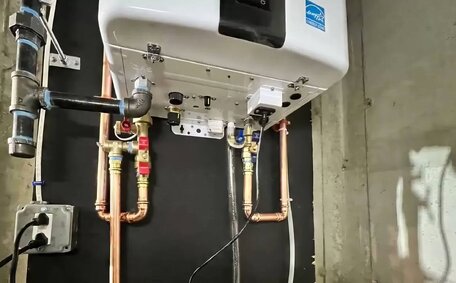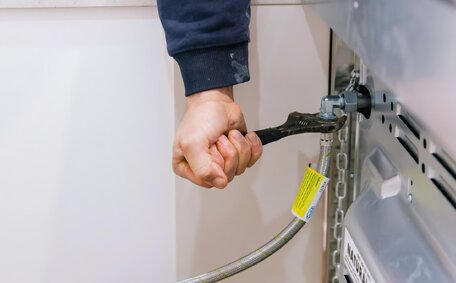For many households, a functional hot water service is essential.
Recognising the signs of a failing hot water heater can help homeowners prevent cold showers and expensive repairs.
Minchinbury Plumbing ensures your water heater is working properly, positioned as a leading plumbing company based in Minchinbury, Sydney. With comprehensive expertise in water systems, we offer various plumbing services for when your water heater tank is compromised, including installations, replacements, repairs and ongoing maintenance.
Knowing signs your water heater needs attention can help homeowners save money, time, and reduce hassle. Here are some insights into common signals that your unit may be declining in performance or even failing.
Lifespan of Different Hot Water Systems
Common hot water systems used in homes include:
- Gas hot water system relies on natural gas or LPG to heat the water stored in a tank. These gas hot water systems typically last 8-10 years on average.
- Electric water heaters use heating elements to warm water in a storage tank. Their lifespan is usually 10-15 years.
- Solar hot water systems harness the sun’s energy to heat water before it enters the home’s pipes and taps. With proper maintenance, they can last over 20 years.
- Heat pump hot water systems extract heat from the air to warm the water supply. Their lifespan is often 15-20 years.
Regardless of the type of system, regular servicing and maintenance of the water tank is vital for longevity. Key tasks include:
- Checking and replacing anode rods every 5 years
- Flushing the tank to remove sediment build up
- Inspecting heating system components such as pipes, valves, and thermostats
- Topping up low water pressure relief valves
Hot water systems often start to decline after they surpass the average lifespan for that type of unit. At this age, breakdowns become more likely. Being aware of some telltale signs can alert homeowners if their system repair is necessary or if replacement is needed.
Warning Signs Your Hot Water System is Failing
There are several telltale signs that may indicate your hot water system needs repair or replacement:
- Temperature fluctuations - Intermittent bursts of very hot or very cold water are a strong indicator of your system failing.
- Strange noises - Odd rumbling, banging or popping noises are signs hot water system distress.
- Discoloured water - Rusty, brown or dirty-looking water could due to sediment buildup or corrosion inside the tank.
- Leaking water - Water pooling around the base of your hot water system likely indicates a leak.
Other concerns encompass a lack of hot water, pilot light issues, malfunctioning heating elements or thermostats, and digital display error codes. The average lifespan of most units is 8 to 15 years, so a hot water system about to exceed this age can also predict problems.
If these warning signs are present, a hot water system check is needed; reach out to our expert technicians at Minchinbury Plumbing.
We will assess your unit to offer solutions for restoring full hot water function.
Strange Noises
Hearing odd sounds coming your way from the hot water service can indicate potential issues. Some common sounds to listen out for include:
- Rumbling noises - These vibrations or rumblings can signify sediment buildup and corrosion inside the tank. Mineral deposits and debris settling at the bottom tank can create this rattling sound.
- Banging or popping - If you hear banging noises like metal expanding, or loud pops, this may point to a problem with the heating mechanism. It likely needs repair.
- Hissing - A hissing noise may indicate a leak in the pressure relief valve or elsewhere in the unit allowing steam to escape.
While some noises like humming or ticking can be normal, unfamiliar sounds demand attention. If your water heater is emitting odd noises and is over 8 years old, it may be going bad, have our technicians inspect it right away. Catching issues early is essential to keep hot water working as expected without the need for a full unit replacement.
Leaks
Discovering a leak in your hot water system may signal issues that interrupt your hot water supply. There are a few key types of leaks to watch out for:
- Water pooling around the base - If you notice water collecting around the bottom of the tank, this likely signals a leak from the internal tank itself or connected pipes.
- Corrosion leaks - Leaking water that appears rusty brown can indicate corroded pipes or tank components that are now leaking.
- Pressure relief valve leaks - A small leak from the pressure relief valve can occur if pressure builds up excessively, requiring release.
Addressing minor leaks swiftly by disconnecting the power and water supply can prevent damage and further complications. Turn off power to the unit and water supply lines if a leak is spotted.
Early leak detection allows for affordable interventions to prevent water heater failure and maintain function.
Untreated, rust accumulation and pressure cracks can deteriorate, intensifying issues over time.
Discolored or Insufficient Hot Water
Noticing water smells foul or seeing it appear discoloured when flowing from your taps is a clear indicator of issues within your hot water tank. Rust particles from deteriorating inner components in appliances your hot water system uses can discolour the water supply red, brown or yellow.
An inadequate flow of hot water - either low pressure or intermittent hot water - could be a sign of a heater failing in elements or controls. Factors like scale accumulating on heating elements, a failing thermostat/control or insufficient energy supply can reduce hot output.
Discoloured water or prolonged waits for hot water often signify internal corrosion or sediment affecting the system. Our technicians can access the tank interior and evaluate necessary repairs or replacement.
High Energy Bills
To learn more about why your energy bills might spike, consider if your hot water unit is becoming less efficient and using more electricity or gas. As systems age and components like heating elements and thermostats degrade, the unit must work harder to heat water. This increased energy usage shows up on your utility bills.
Evaluate whether energy bills are increasing without changes to hot water usage, which may point to system inefficiencies.
Also take your water heater’s age into account - If your water heater is about more than 10 years old, declining efficiency is highly likely the culprit behind those higher energy costs. Have our hot water experts inspect your system. We can troubleshoot issues and suggest repairs or replacement solutions to restore efficiency and reduce costs.
Routine Maintenance to Prolong System Lifespan
Performing routine maintenance on your hot water system is vital for the longevity and reliability of plumbing in your property. Simple upkeep tasks to undertake include:
- Flushing the tank - Annually drain a gallon of water from the tank’s drain valve to clear sediment. This prevents buildup from corroding components.
- Inspecting anode rods - Check the metal anode rod after 5 years and replace if corroded. This rod protects the inner tank.
- Testing heating elements and thermostats - Ensure heating elements aren’t cracked or worn and check thermostats are accurately regulating temperature.
Additional Do-It-Yourself tasks like topping up pressure relief valves can also sustain performance. Or call our team - we’re happy to maintenance your system.
Staying on top of routine servicing minimises breakdown risks and can extend your hot water system’s lifespan by years. Give your unit the best chance of outlasting its standard lifespan.
When to Call a Professional Plumber
Calling in a professional plumber is advised If you observe any signs of trouble as described. Attempting to repair issues on your own can jeopardise personal safety, system integrity and warranty coverage.
Our licensed technicians specialise in ensuring proper system functionality by inspecting it for required repairs or replacements.
- For temperature fluctuations or strange noises, you’ll need our professional scrutiny to troubleshoot root causes and service components like heating elements or thermostats.
- For water coming from leaks, we can swiftly address them before major water damage or pressure buildup occurs.
- If you have dirty water or inadequate hot output, we can flush sediment and scale from within the tank and pipes.
Our preventative maintenance services enhance performance and extend the time between breakdowns. We invite you to reach out day or night to find out how we can support your hot water needs.
Contact Minchinbury Plumbing on 1300 349 338 or jobs@minchinburyplumbingservices.com.au whenever issues with your system arise. Catching problems early allows for affordable solutions.
How to Select a New Hot Water System
When it’s time to replace your ageing or faulty hot water system, there are a few key factors to consider when selecting a new unit:
Type of System
Select among gas, electric, heat pump or solar hot water systems. Consider efficiency, operating costs, energy sources in your home, and upfront expenses for each type.
Tank vs Tankless
Traditional hot water tanks hold water, while tankless water systems (also called continuous flow) heat it instantly without a tank. Evaluate your household’s hot water usage patterns.
Size
Ensure your system is properly sized to meet your home’s hot water demands. Undersizing leads to insufficient hot water, while oversizing wastes energy and money.
Efficiency Ratings
Select an energy-efficient model to save on electricity or gas bills. Look for a minimum 3-star rating for electric or 5-star for gas systems.
Warranty
Opt for units with at least a 5-10 year warranty on the tank. Quality systems will guarantee the core components against corrosion for this period.
A correctly sized, energy-efficient system prevents future complications.
Our Minchinbury Plumbing team possesses extensive expertise in selecting appropriate hot water systems for Sydney homes. Contact us for recommendations suited to your household.
Conclusion
Having continuous access to your hot water heater is essential in any home. However, hot water systems eventually decline and fail over time.
Homeowners who pay attention to signs such as temperature fluctuations, unusual noises, leaks, and rusty water can identify problems early on.
We recommend contacting a professional plumber right away if you notice these common signs of a failing system. Attempting DIY repairs is not advised due to safety issues and warranty limitations. The experts at Minchinbury Plumbing have the skills and experience to properly diagnose problems and restore full hot water function.
Catching small issues before they escalate into major breakdowns allows for more affordable solutions. We can troubleshoot fixes to extend the lifespan of ageing units. When replacement is necessary, we help homeowners select new systems sized and equipped for their household needs.
Trust Minchinbury Plumbing for prompt, reliable service whenever hot water system problems arise. Contact us or call 1300 349 338 with any concerns about your hot water supply. Investing in timely maintenance sustains convenience and reduces unnecessary costs over the long run.






